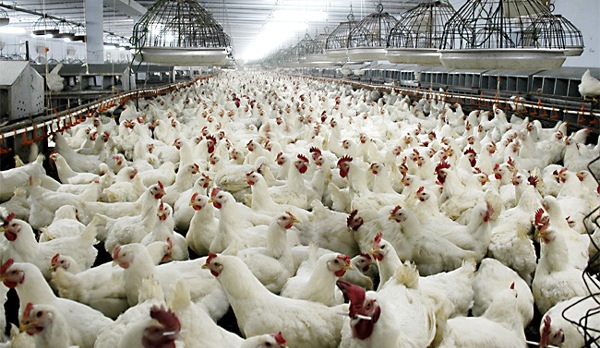
Agricultural News
Bird Flu Arrives- First 2017 Case of Highly Pathogenic H7 Avian Influenza in a Commercial Flock Found in Tennessee
Mon, 06 Mar 2017 03:53:37 CST
 The United States Department of Agriculture's Animal and Plant Health Inspection Service (APHIS) has confirmed the presence of highly pathogenic H7 avian influenza (HPAI) of North American wild bird lineage in a commercial chicken breeder flock in Lincoln County, Tennessee. This is the first confirmed case of HPAI in commercial poultry in the United States this year. The flock of 73,500 is located within the Mississippi flyway. Samples from the affected flock, which experienced increased mortality, were tested at Tennessee's Kord Animal Health Diagnostic Laboratory and confirmed at the APHIS National Veterinary Services Laboratories (NVSL) in Ames, Iowa. Virus isolation is ongoing, and NVSL expects to characterize the neuraminidase protein, or "N-type", of the virus within 48 hours.
The United States Department of Agriculture's Animal and Plant Health Inspection Service (APHIS) has confirmed the presence of highly pathogenic H7 avian influenza (HPAI) of North American wild bird lineage in a commercial chicken breeder flock in Lincoln County, Tennessee. This is the first confirmed case of HPAI in commercial poultry in the United States this year. The flock of 73,500 is located within the Mississippi flyway. Samples from the affected flock, which experienced increased mortality, were tested at Tennessee's Kord Animal Health Diagnostic Laboratory and confirmed at the APHIS National Veterinary Services Laboratories (NVSL) in Ames, Iowa. Virus isolation is ongoing, and NVSL expects to characterize the neuraminidase protein, or "N-type", of the virus within 48 hours.
APHIS is working closely with the Tennessee Department of Agriculture on a joint incident response. State officials quarantined the affected premises and birds on the property will be depopulated to prevent the spread of the disease. Birds from the flock will not enter the food system.
In a statement, Tyson said it was working with state and federal officials to contain the virus by culling the flock.
In addition, the Tennessee facility has been placed under quarantine, along with about 30 other farms in a 10 km radius of the affected farm. Flocks in that area are being tested.
According to the Tyson statement- "We're addressing a form of avian influenza on a single contract chicken farm in Tennessee. It's a bird health issue and not a food safety or human health concern. We're responding aggressively, and are working with state and federal officials to contain the virus by euthanizing chickens located on the farm. This not only prevents the potential spread of disease, it is more humane for the infected birds. All flocks located within a six-mile radius of the farm will be tested and will not be transported unless they test negative for the virus. Based on the limited scope known to us at this time, we don't expect disruptions to our chicken business and plan to meet our customers' needs." Click here for the complete Tyson Statement.
As part of existing avian influenza response plans, Federal and State partners are working jointly on additional surveillance and testing in the nearby area. The United States has the strongest AI surveillance program in the world, and USDA is working with its partners to actively look for the disease in commercial poultry operations, live bird markets and in migratory wild bird populations.
USDA will be informing the World Organization for Animal Health (OIE) as well as international trading partners of this finding. USDA also continues to communicate with trading partners to encourage adherence to OIE standards and minimize trade impacts. OIE trade guidelines call on countries to base trade restrictions on sound science and, whenever possible, limit restrictions to those animals and animal products within a defined region that pose a risk of spreading disease of concern.
The poultry trade group, US Poultry and Egg Assoiciation, would like to remind its members of the USDA Checklist for Self - Assessment of Enhanced Biosecurity that is available by clicking here, in addition to other resources for interventions on the farm. Further information on biosecurity measures can be found on the USDA APHIS website by clicking here.
"With this positive H7NX finding, there is an urgent need for all poultry producers to be vigilant in m aintaining biosecurity on farms, particularly wi ld bird control at this time of year. The self-assessment tool will help identify any weaknesses on a farm, and numerous resources are identi fied to address any deficiencies , "said Dr. John Glisson, vice president of research programs for USPOULTRY.
WebReadyTM Powered by WireReady® NSI
Top Agricultural News
More Headlines...




